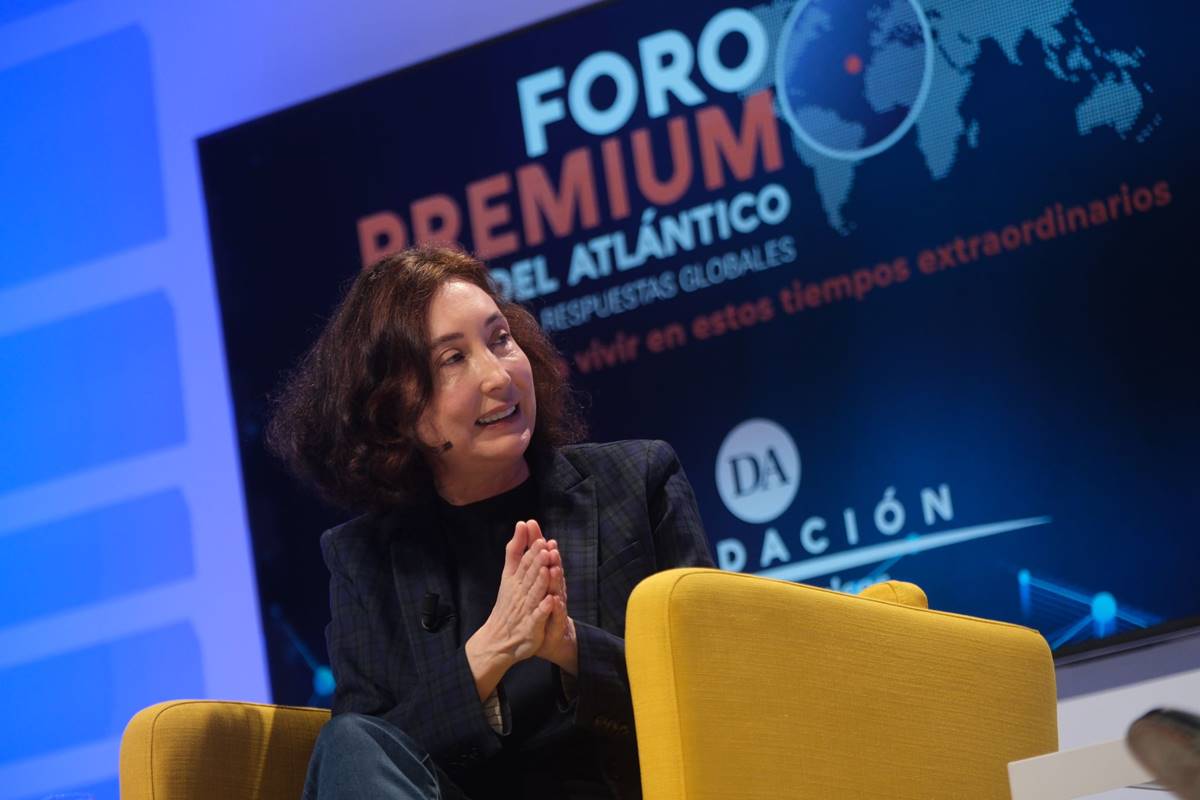The philosopher and writer Elsa Punset was the protagonist of a new edition of the Atlantic Premium Forum of the Diario de Avisos Foundation, in collaboration with the Department of Culture of the Cabildo of Tenerife. Punset addressed such topical issues as the addiction of young people to digital media, the need to live in the present in order to “gain years of life” while at the same time facing the challenge of Artificial Intelligence, a true “revolution” that Humanity must face “by placing value on ethics”.
Punset pointed out that, curiously, we are living “the most privileged 25 years in the history of humanity”, but “because of the speed at which we live we are not realising that we know how to live these extraordinary times”.
Punset asked “how many people in the world have access to electricity?” or “how many girls finish primary school in the poorest countries in the world?” to put into context what she wanted to explain in relation to the pessimism “that has been installed” in today’s society: “80% have access to electricity and in terms of education, 60% can do so, although there is still a long way to go. We are pessimists, but the world has been evolving for centuries. We have to remember: the world is improving.
The writer, questioned as to why she does not see “the glass as half full”, acknowledged that this is one of the most important issues to be tackled: “Everything is changing at an unprecedented speed. Electricity took almost 50 years to reach our homes, and we have decades to get used to the speed at which we are changing, but the current feeling that we have, of living in a world full of uncertainty and change, brings us a mental health problem. Because we have a Paleolithic-adapted brain, loaded with mental and emotional habits. We look to the future with a certain anxiety and stress; we are highly stressed.
ELSA PUNSET: PATHS TO OPTIMISM
Is there a solution to this? Punset is clear: yes, “We have been told for centuries that the brain is immutable, but three decades ago neuroscience managed to enter the black box of the brain and saw that it is plastic, which means an enormous key to freedom for people. You are not obliged to do what your genetics say,” he stressed: “Optimists tend to solve more problems, have more friends or better jobs. Optimists and pessimists have the same problems and 50% of optimism is genetic, but it is something that can be worked on.
But, at this point: how can optimism be cultivated? According to Elsa Punset, it is necessary to put certain skills into practice: “With adolescents we work a lot on optimism because the human brain is not mature until the age of 24. When adolescents despair, they do like the great pessimists, they fall. We can never think that we are in a well, because there is no way out of a well, but rather in a tunnel, looking for a way out.
It is important for an optimist to be realistic”. To this end, according to Punset, it is essential to “take care of ourselves” by managing to “reconnect” with the natural world: “Life is a constant stress: if you don’t take care of yourself, you end up exhausting yourself”.
ADOLESCENTS, THE KEY
Another of the great challenges facing our society has to do with the ability to deal with the problems of adolescents and, as a key aspect, addiction to screens, which is a real pandemic. “Young people are a generation of guinea pigs, especially those born since the beginning of this century. It is not until 2019 that we will begin to have data on what is happening with screens.
Generations that grew up outdoors are suddenly seeing screens put in their hands, with phones that grab you. Technology can have a stimulating effect, but with rules. One in four eight-year-olds has seen pornography: what kind of education are we giving them? We have overprotected them physically and abandoned them with technology. They are very much victims.
She also stressed the need to set rules, to regulate access to screens as is done with other everyday issues: “The young child, on a screen, only sees something very funny, not something that is impacting on their mental health. “A friend of mine says that when children are young you are their coach, but one day they grow up and fire you as a coach and hire you as an external consultant, which makes everything more complicated. You don’t have to be on top of that person, you’ve been with them for 15 years, you just have to help them, educate them and help them enjoy their freedom.

PROTECTING GIRLS
Stress and anguish among young people has skyrocketed since 2010, as has self-harm: “Our daughters are particularly vulnerable, that sensitivity of girls, that need for social approval, is very dangerous. We have to help them not to be so dependent on the opinion of others. The Civil Code, until 1977, described women as weak, unthinking, immature or broken. I was born with that description. Girls still carry a lot of social prejudice, even though we have made progress. Why do girls in their teens only think that engineering is not for them and only 20% choose it? Because there is a general feeling that they are not as good at science, that is a reality”.
In addition, she stressed that the “main problem for women is self-esteem”, with places such as social networks where “they are attacked”, making it necessary to “protect our girls”. “My 19-year-old girl is very anti-mobile, but she was talking to me about a friend of hers and she told me that she spent hours on her mobile phone and recognised that it was bad for her soul. I thought that was a great way of defining it”.
SOCIAL RELATIONS
Paradoxically, in a society increasingly interconnected by technology, direct, social relationships are presented as the indispensable ingredient for achieving happiness. Harvard University says in a study that is considered one of the most important worldwide: “Mental and physical health go hand in hand. The quality of social relationships either lengthens your life or shortens it. Long lives must be filled with quality.
John Gottman is an American psychologist who has been studying the secret of good relationships for years and wonders how to do it. He has a system. He listens to married couples and writes down a series of parameters. After 15 minutes he knows, with a 95% accuracy rate, who is going to separate in the next five years. Gottman says that mindfulness is a form of love and care for the other. Time, love, affection… These are the basis.
Punset admitted that productivity, the lack of time, is one of the impediments to achieving those social relationships that make us happy and for this it is key to “fit in with the environment” and live in the present: “Buddhists say that our heads are monkey cages, that it is very difficult for us to live in the present and it is extraordinary that one of the solutions offered to us by neuroscience is meditation. Our children are the greatest meditators and we should learn from them”.
THE FEAR OF AGEING
Evolution has meant that we are living longer and longer, but, curiously, the fear of ageing is one of our greatest fears: how we will get to old age. Punset believes that life must be recognised as “a miracle” and “a mystery” that we must receive as an “immense luck” for everyone: “There is a race of thousands and thousands of spermatozoa to be able to give birth to a person. To be born is a miracle.
There are lives in which you are born free and you are burdened with chains and obligations. We are afraid of growing old, because we live in an ageism thinking that life is at its peak at 30 and then it all goes downhill, especially after 50. We are wrong about the brain, because there is no peak time for it. As life goes on, the two hemispheres of the brain complement each other better: you see the whole forest, not just the tree.
THE IA AND THE GREAT REVOLUTION
As the next great challenge, Elsa Punset looks to Artificial Intelligence. In a world full of changes, a true “revolution” is also coming that will make it necessary to recover values and ethical aspects that we have recently put aside: “The fact that there will be a machine that does almost everything better than you will be a great revolution, but also a great challenge. We can’t imagine what humanity will be like in five years’ time, but I believe that everything depends on recovering those ethical values that we have abandoned. That will be very human and it will be our strength, the strength to be able to choose.
Punset also saw positive aspects of the arrival of AI as she believes that “it will free humanity from tedious tasks, which will leave us more time to rethink what humanity is, possibly helping us to be happier”.







